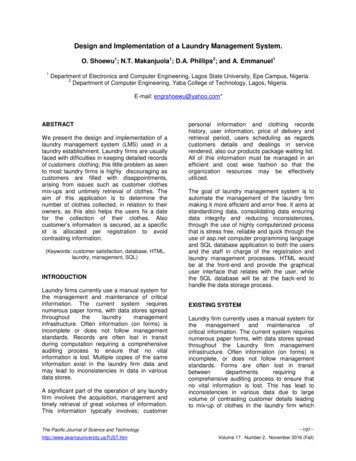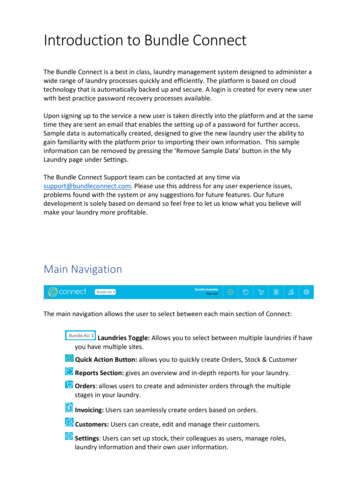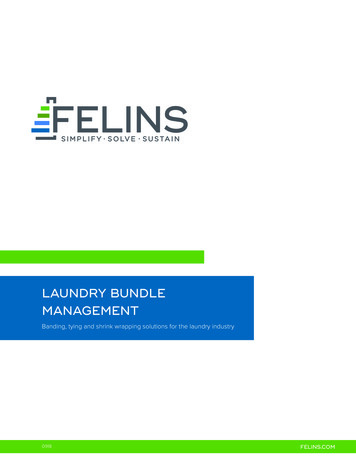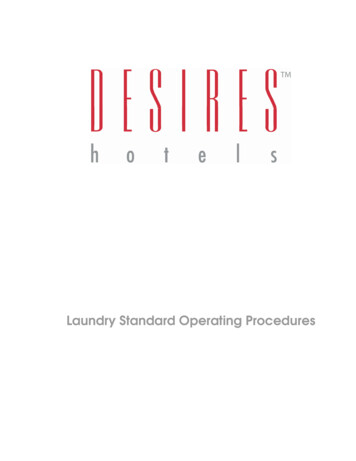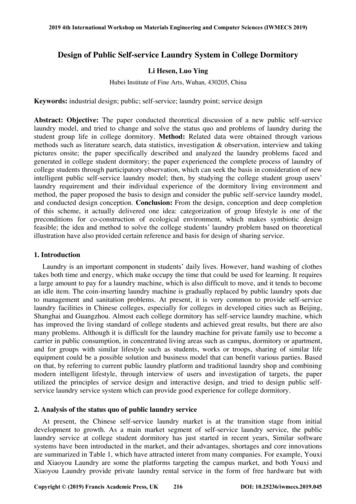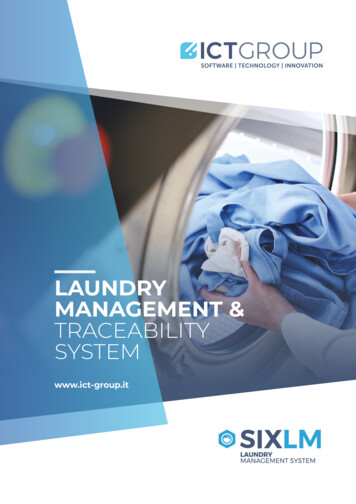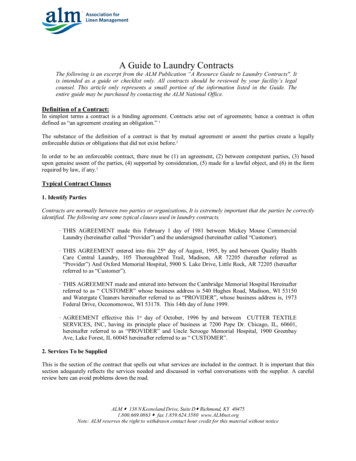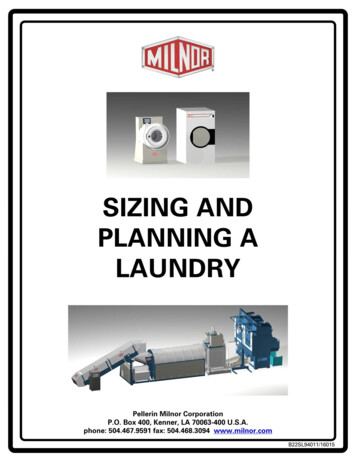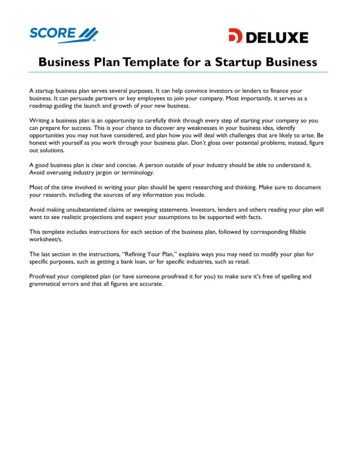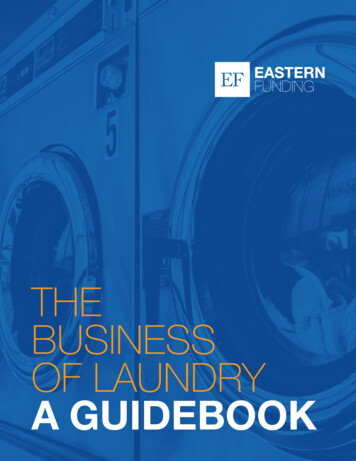
Transcription
THEBUSINESSOF LAUNDRYA GUIDEBOOK
TABLE OFCONTENTS1 Getting Into the Laundry Business8 If You’re Acquiring a An Existing Laundry9 Starting From Scratch10 You’ve Made Up Your Mind15 Now That Your Laundromat is Up & Running16 Thinking of Refinancing?18 Need a Loan?19 Time for your next store?21 Time to Sell?
GETTING INTO THELAUNDRY BUSINESSSo you want to get intothe coin-op laundromatbusiness?So you want to become the next owner/operator of your friendly neighborhoodlaundromat? Getting into the coin-op business can be very rewarding, but opening onesuccessfully might require you be a little creative with your business. Take what youthought you knew about laundromat enterprising to the cleaners.Coin-op creativityIt’s a surprisingly exciting time to be in the business. Facilities where people used tosit and wait for their drying laundry under popping and sparking florescent lamps havereceived a facelift. To be successful in the business, you’ve got to turn “that laundromat”into “The Wash.”“The industry is now getting a facelift,” President and CEO of the Coin LaundryAssociation, Brian Wallace, told Entrepreneur. “There’s a trend toward coin laundriesbeing more comfortable for the customer.”Today, many urban-dwellers’ time is crunched. Personal and professional duties are beingblended – and with them – so are habits and hangouts. The rise of Starbucks is a perfectexample. Students can get coffee while they study. Professionals can conduct businessmeetings while caffeinating for the rest of the workday. Laundromats are adapting too:Many now include snack bars or video games. Some – like New York’s Wash House –serve gourmet grilled cheese in addition to being a drop-off dry cleaning service.“Our coffee shop is a bar, cafe and a laundromat,” Lee Kerzner, native New Yorker andowner of the New York Wash House, told CNN Money. “It’s a winning formula. Theresponse from the local community has been amazing. We’re doing more laundry thanwe ever expected and selling out of coffee.”The trend isn’t just going strong in America either. Only last year, a similar laundromatbusiness plan took off in Montreal.Chaz Desousa is the co-owner of Le Petit Bas Perdu: in English, “The Little LostNetherlands,” the Montreal Gazette reported.“The laundromat had to be super-clean and well-functioning, but I wanted it to behomey and welcoming, and fun and quirky,” Desousa said. “With the café up front,people don’t mind waiting around until their clothes are washed and dried.”Keep in mind that most successful laundromats will require a staff – if only part time.General housekeeping, basic maintenance and custodial duties are an everydayoccurrence. This can be one reason why running a hybrid business from the samelocation can not only maximize your real estate and investment, but also make it farmore successful.Introducing thehybrid business:Take what youthought you knewabout laundromatsto the cleaners.
Location evaluationComing up with a winning business plan will count for nothing without giving it theopportunity to grow. Your laundromat doesn’t necessarily need a Main Street address toachieve success. Everyone needs to do their laundry, so just thoroughly connecting withthe community can be enough.Being within a mile or two of working-class neighborhoods could mean prosperity formost simple coin-op businesses. According to HK Laundry, another proven tip is toplace your business near multifamily housing. Typically, these models are structured sothat only one family – the residents located in the basement – will have easy access to awashing machine. The other three will need to do their laundry elsewhere, and can be agold mine.For hybrid business models, placing your bakery/dry cleaners or delicatessen/laundromat in a highly trafficked area can spell success. If potential customers arealready hanging out in the area – why not give them multiple reasons to hang out inyour store(s)? If you’re ready to invest but aren’t sure which direction to take yourfoundationally laundry-based investment, ask yourself what people might need, wherethey may need it and if it could pair well with the standard one- to two-hour laundromatdown time.Check out EasternFunding for more useful tips on marketing your small business.Old url: into-the-coin-oplaundromat-business5 reasons why you’reready to start your ownlaundry businessThe laundry industry is one of the most robust and stable in the country. These servicesare always in demand, and most individual businesses are around for decades in onelocation.This makes laundry the perfect industry for entrepreneurs and fledgling businessowners. It is often a smart investment, and it can be a fun, rewarding experience. Evenso, starting your own laundry business isn’t a decision you can make rashly. You have toknow you are ready for the task at hand – a lot goes into running your own company.Here are five signs that you are ready to start your own laundry business:1. You’ve got the desireThe first sign is that you want to become part of the laundry industry. You can’t “kindof” want to own a business. You have to be fully committed to the process, from thebeginning all the way through to the end. Truly great entrepreneurs love their job, andthey love the challenge of branching out and building something on their own. Thispassion is the best way to survive as a business owner. Once you’ve got that, you canmove on to actually starting your own venture.2. You’ve got the ideaAfter the passion comes the idea. You can’t build a business without a plan, and thatstarts here. Figure out:
What type of laundry business you want – There is the self-service laundromat,the wash/dry/fold laundromat, the dry cleaner, the commercial laundry service andmore. Where you want to own and operate – Location matters. Check out our list of theelements that impact a laundry’s value for more information. Location can meanlower costs and more customers – or the exact opposite. What your brand is – Decide what you want to call your business, how you want tobe marketed and other vital brand information.Know as much as possible before moving forward with laundry business ownership.3. You’ve got the financesOf course, money matters when it comes to business ownership. You can’t buy or buildwithout sound personal finances first. Make sure your new venture won’t negativelyimpact your own savings. Look into affordable business financing first, and figure outhow much collateral you’ll have to put up. If you’ve got the money to invest – and risk –then you’re ready to take your first step.4. You’re happy with your own jobThis is an important sign – personal happiness with your current job. While youobviously want to branch out and try something new, this doesn’t always mean youactively hate your job. Becoming an entrepreneur because you’re angry at your bossis a bad place to start from. In this scenario, you would be motivated by anger andunhappiness – not passion and desire. The former are more likely to fade quicker thanthe latter, and that could leave you right back where you started.5. You’ve got the teamThe final sign that you are ready is that you’ve already built your team. A businessowner, especially a first-time entrepreneur, can’t do it alone. They need to work with: LendersBrokersReal estate agentsBankersLawyersYou should also pair up with a fellow business owner, preferably one in the laundryindustry. This person will serve as your mentor, offering advice and guidance on how thebusiness works and what you need to do to be successful. By having the right team inplace, you’ll be more likely to succeed – and you won’t be trying to find your way in thedark.Once you’ve seen these signs, you’ll be that much closer to owning your own laundrybusiness.A beginner’s guide to yourlaundromat’s businessvaluationDo you know how much your laundromat is worth? Believe it or not, having a clearanswer to this question can be very important, whether you are about to sell yourbusiness or if you simply want to know.5 reasons whyyou’re ready tostart your ownlaundry business
You may also be asking: “What is a business valuation?” At its core, a businessvaluation is simply the fair value of your laundromat given the current economicenvironment. While an estimate, it carries quite a bit of weight if you can support howyou got to it. Speak to industry friends, insiders, distributors and even competitors toget an idea of how they value laundries. Every market has its own nuances, and there isno cookie-cutter method or math for a store’s worth.That said, there are some basic approaches you can use, and a business valuation isvital for a business owner in several key instances, including: Before a sale – Having an up-to-date, accurate valuation of your laundromat willhelp ensure you get the best possible price when you do sell. During a major change – You will want to know the exact value of your laundromatwhen you sell, decide to alter your business model, introduce new services (likecommercial accounts) or undergo any other type of change. Ahead of a major decision – A business valuation will shed light on your currentfinancial situation. That information can then be used to make other intelligent choices,say if you’d like to expand or use the store’s equity to complete a new project.The types of business valuationIt can be incredibly beneficial to know a few details regarding business valuations,should you want one completed for your laundromat. At Eastern, we’ve written internalwhite papers that we use as a guideline for establishing approximate values.There are three main types of business valuations. Each involve different methods ofcomparison that can impact that final value. According to Inc. magazine contributorMike Handelsman, each one has merits depending on the type of business you operate.The three types include:1. Asset approach – Like this sounds, an asset-based valuation approach analyzesyour laundromat’s existing assets to determine its value. Handelsman explained that thismethod can be overly simple. It is also not prevalent in the industry for existing storesbecause it overlooks other components of a business that can factor into value (likemarket share, community goodwill, etc.). It can be used for establishing value for newstore projects and is often used for certain sales and liquidations. A key point for laundryowners to consider is that some assets aren’t visible to the naked eye. In markets withhigh impact fees, there is definite value in the cost, already paid, for those fees.2. Income approach – The second approach is called the income approach, accordingto CPA and advisory firm Carr, Riggs and Ingram. As explained by CRI, this methodrequires valuators to look at your business through the lens of future income, net incomeand cash flows, among other elements.This can be looked at two ways: gross income and net income. This method requiresvaluators to analyze your business through the lens of future income, net income andcash flows, among other elements. Gross revenue – You may say: “Why would I value a business based on grossrevenue? I care about cash flow and income.” Well, the main reason would be tosupport or bolster a valuation based on net income. It can tell you how efficient youare. It can help as a comparison tool, because you may not know your competitors’expenses, but you might have a very good idea of what they gross. We use amultiple of weekly revenue to get an approximate value. Our experience at Easternis that on average stores, we’ve financed sale prices of approximately 70 weeksrevenue. Smaller, lower volume stores with old machines could sell for 50 to 60weeks, but this could escalate as high as 90 weeks on larger high-volume stores.“A business owneris inclined to placea higher value ontheir store than apotential buyer.You’ll need to knowhow to back upYOUR valuation.”
Net income – A valuation on net income is far more common for valuing stores.Often expressed as a multiple of “earnings before interest, taxes, depreciation andamortization,” or EBITDA, values as a multiple of EBITDA range from three timesto five times the annual earnings. Larger stores with newer equipment tend to sellfor higher multiples than smaller stores with older machines. In some markets,laundries are commonly valued as a higher multiple of monthly net income. Eitherway, you are taking the cash flow of the store and translating into a manner thatowners and investors within a given area expect to see. While the value you comeup using both of these approaches may not match exactly, there should not be adramatic difference between the numbers you come up with.3. Market approach – The third approach is the least formal and is tied to what expertsin a given market “know” about area trends and store values. Some markets place ahigh premium on store size, others may key more on the verifiable cash flow or costsas a percentage of income. Either way, the discounts or premiums on the value of yourstore are affected by the interests of others in your market.How to improve your current valueSay you want to upgrade your existing business value – what can you do? Whether for asale or simply to improve your laundromat, it is worth it to explore a few of the availableoptions to boost your value, because all stores values can be affected by potential“discounts” and “premiums.”The most common discounts/premium factors for laundries include: Premise lease – The premium is the long remaining term and is cost PSF low, whilethe discount is short term, no options and a cost PSF high.Equipment – The premium is new equipment, while the discount is olderequipment.Competition – The premium is best in the market, with limited competition threat,while the discount is heavy competition.Locations’ size – The premium is a larger store in a dense area, while the discountwould be a smaller store.Net income – The premium is high profit with stable expenses, while the discount isa low-profit storeMiscellaneous – The premium is impact fees, while the discount is weakdemographics.If you have machines older than 10 years and the potential to enjoy efficiency savings, itmay be time to re-tool. If there are less than 10 years remaining on your lease and you’dlike to re-sell the store, maybe the landlord will negotiate an extension today. Regardlessof the size of your store, there is always something that can be done to improve costefficiency, freshen up the look and make sure the customer experience is high quality.Most importantly, you should look for a way to set your laundromat apart. Look to theindustry association and make connections to figure ways to develop new methodsto become more efficient or to implement another creative idea. This will make yourlaundromat more valuable than the similar laundromat down the street.Overall, keeping a running valuation for your store or stores is a good idea becauseyou’ll never know when a major life event, opportunity or situation will arise that willrequire you to act on that value.Old url: ss“Set yourlaundromat apartin order to increaseits value.”
An in-depth look into howyour location affects yourbusiness’ valueHow does your market factor in to your laundry’s value? In our previous article, wementioned how the market can affect your coin laundry business.Certain aspects included: ParkingPublic transportationNearby housing or businessesHowever, the market’s influence can go beyond these basic elements. The market canalso include a number of financial elements, from utility bills to zoning regulations, taxlaws and legal requirements.Here is an in-depth look at how your market will affect your laundry business’ value:Know your local expensesThe main way your market influences your coin laundry’s value is through costs. Asimple example is your monthly utility bills – a store in one location could have lowerwater bills than a store in another location. Without taking any other factors intoconsideration, the location with the lower utility bills is already more valuable.“The costs could be lower – or higher – in one location over another.”This is especially true in the New York area. Water bills are typically higher there thanin other parts of the country, which means New York-based coin laundries have to findother ways to increase value. Another example is the San Diego market. Here, sewerfees for businesses are relatively low. This means San Diego already has a leg up onother markets, especially for a sewer-reliant business like a coin laundry.Your utility bills will vary depending on location. So, before you acquire a new coinlaundry or invest in your first, make sure you know the local expenses. These costscould emphasize the right choice over the wrong one.Know your local lawsIn addition to local costs are your legal requirements. One is zoning laws, which greatlyaffect all types of businesses.Zoning laws impact: Where you can build a businessWhat you can do in that businessWhile you may have found a location that is perfect for a new coin laundry, the zoninglaw could forbid that type of business on that land. This can make it a lot more difficultto buy and open new laundries in certain locations. In many cases, it is more viable toacquire an existing business than navigate zoning laws and other legal requirementswhen opening a brand-new store.Either way, though, make sure you know your legal requirements before making anysignificant decisions with your laundry business.“The costs could belower – or higher –in one location overanother.”
Know your impact feesThe third important consideration regarding your market is impact fees. Impact fees aredefined as payments to local governments for offering new or expanded public capitalimprovements. In relation to laundry businesses, some of the most common “capitalimprovements” are sewer and water services.Impact fees make sense from a city standpoint – they are used to offset the costsof creating new public works facilities just for your business. From your perspective,however, impact fees are something you may want to avoid. For instance, if you want toexpand to a new location, but it has high impact fees, you may be better off looking for adifferent site.No matter your choice, understanding how impact fees will play into your overall costs isa substantial way that the market affects your business’ value: Lower fees, and the morevaluable your laundry may be to the right investor.Learn how zoning laws affect value.Complying with local legal requirements will impactyour business.Make the market a top priorityWhether you are acquiring another coin laundry, starting your own business for the firsttime or finding a site to expand your existing operations, the market is one of the mostimportant factors to consider.To recap, keep in mind: Utility billsZoning lawsImpact feesA city ordinance, a lack of public works, a certain fee or another cost altogether may notseem like a breaking point for a location, but these elements can sway the value of alaundry business.Complyingwith local legalrequirementswill impact yourbusiness.
IF YOU’RE ACQUIRINGAN EXISTING LAUNDRY4 steps toward improvingyour odds of getting a loanThe financing stage of a laundry startup may feel like the most overwhelming step attimes. However, nerves don’t have to be a part of this process – in fact, some smartplanning will make your search of quality laundry business or equipment financing awhole lot easier.Here are four effective tips to improve your odds of getting a business loan:1. Focus on yourselfThe first step is to take a look at yourself as a business owner. Lenders will look at yourpersonal character, your entrepreneurial experience and your financing history. Whileyour new business is important, what you’ve done in the past matters. Of course, thisalso includes your credit history – both professional and personal. Make sure there areno errors in your credit report, and if you have a bad score, spend some time gettingthat number a bit higher.2. Gather all the factsThe more information, the better – at least from a lender’s perspective. In your searchof financing, lenders will want to know every detail about your business. Your odds oflanding financing will increase if you give it to them.Frequently requested details include: Profit and Loss StatementsUtility Bills – Gas, Water, Electric (three months)Personal and Business Bank StatementsPersonal and Business Tax ReturnsCopy of premises lease or deedUnfortunately, many business owners get in their own way at this time by holding backbusiness information that is requested by their lenders.3. Mitigate riskRisk management is the name of the game in lending, but many business owners forgetthat when applying for financing. For example, too many are interested in “thinkingoutside the box” and “getting creative” in their pursuit of a loan. This can backfire.The better option is to be perfectly ordinary, but focus on executing the loan proposalextremely well. This means demonstrating profitability, minimizing a dependence ondebt and showing a strong supply as well as demand. Lenders want to see just howsecure and safe your laundry business is.4. A quality businessPerhaps the most important tip is to make sure your business is in tip-top shape. Whatthis means is quality. Begin with a business in a good location. Also focus on creatinga strong customer base, excellent growth potential and other key factors behindsuccessful companies.These traits arewhat lendersare looking for.The loan is aninvestment, afterall, and they wantto make sure theyare investing in astable, prosperousbusiness.
STARTINGFROM SCRATCH4 things to look for whendeciding where to open alaundromatAs is the case with many customer-facing businesses, it’s crucial that laundromatstartups consider the area in which they want to operate before they take any furthersteps. Sometimes a location may seem ideal in a few aspects, but others are sosuboptimal that they negate the benefits of opening in that area. Here are a few thingsthat every laundromat owner should consider before signing the lease to buy a location:1. Nearby populationDifferent laundromats will have varying operating costs. Some may be able to surviveserving small towns. Others may need proximity to bustling residential areas orcommercial centers. This is why it’s so important to look at the needs of the laundromatin the context of the customer base – entrepreneurs can only afford to open up shop inareas with enough people to sustain their businesses.Digging deeper, population size isn’t the only metric laundromat owners should belooking at. Demographic factors such as affluence and age also tend to influence wherecustomers go to do their laundry.2. ParkingThere is nothing more frustrating than going to a laundromat and being unable tofind a spot. Entrepreneurs should try to offer as many parking spots as needed toaccommodate all of the washer and dryer units available for use in the laundromat,preferably via a nearby lot. However, this may change based on the location as well –some areas, such as Boston, are easily accessible with public transportation, so parkingisn’t as important.3. ExposureWhere is the laundromat located in relation to where people are coming from? Visibilityis important for both marketing purposes and when simply trying to find the place.Ideally, entrepreneurs want to be easily accessible to customers, and the closer they areto major traffic centers, apartment complexes or other heavily trafficked areas, the bettertheir visibility will be.4. FeesAnother crucial thing that laundromat owners will need to take into account are feesattached to where the business is established. In some cities, the municipal costs ofhooking up water and sewage lines may be prohibitive. Owners should try to calculatethese fees – along with impact fees, tap-on fees and wastewater fees – before settlingon one location. To get started, owners should contact the local water authority todetermine fee schedules.As is the case withmany customerfacing businesses,it’s crucial thatlaundromatstartups considerthe area in whichthey want tooperate before theytake any furthersteps.
YOU’VE MADE UPYOUR MINDBookkeeping 101:Money management forthe laundry businessBookkeeping doesn’t exactly rank high on the list of fun things to do as a businessowner. However, accurate bookkeeping is a must for any entrepreneur and smallbusiness, and it is incredibly important for those who want to grow their ventures in thenear future.The benefits of bookkeeping include: Improved organizationFinancial predictionsTax complianceAccurate spendingMore financial awarenessIn the laundry industry, it is vital to know about profits, revenue, expenses and otherrelated elements. You want to be able to plan ahead and ensure your business remainssolvent, and bookkeeping is the first step toward accomplishing that goal.Here are a few tips for how you can improve your business’ bookkeeping:1. Manage your timeBookkeeping can be a time-consuming process. You want to dedicate the rightamount of effort, but you don’t want it to interfere with your other duties or become anundesirable chore.That is why the first step toward better bookkeeping is time management. For starters,set aside a block of time each week to look over your books. You may only need an houror two, but creating a set schedule will help you remain focused and ensure you don’t letthis task slip by.2. Get the right toolsBookkeeping can be made a whole lot easier with the right tools in place. Technologytoday is designed with bookkeeping in mind, like software and mobile applications thatallow you to check in remotely.Gone are the days of bookkeeping with paper and pencil. Tools like QuickBooks orcloud computing can help you out with your accounting needs. Give a few options a trialrun when you are getting started, and don’t be afraid to try out new technology that maygive you an edge.3. Organize your recordsYou won’t be able to perform accurate accounting for your laundry business without theright records. One key money-management tip is organization.“Let bookkeepingmake other aspectsof your businesseasier.”
You can begin by tracking down all related financial documents. Then, store these in oneeasy-to-access location. Naturally, online is better, since you can view these files fromvarious devices and at any time. Keep items in neatly labeled folders and make sure youhang on to all business receipts, invoices and other expense documents for later review.4. Ensure tax complianceTax season can be one of the most frustrating times of year for a small-business owner.To make matters more confusing, there are many additional deadlines for business taxesin addition to the April deadline for personal taxes.Therefore, take note of all related tax deadlines for your business. You may also want tocreate a separate fund just to deposit future taxes into. A little bit throughout the yearcan ensure you have enough to pay taxes and won’t have to find other ways to come upwith that money. Non-compliance with the IRS and the Department of Labor can be amajor headache for a business owner.5. Plan aheadPlanning ahead should be a key part of your bookkeeping efforts. Your expenses areone item that should be on your mind – track upcoming purchases, payroll costs andother factors that will impact your business.Knowing what’s coming around the corner will naturally help you prepare, plus it willalso give you time to research loans and other financing options, if needed. It is alsobeneficial to create a detailed calendar of your business expenses, even looking as faras a few years into the future. The last thing you want is to have a major cost creep upon you.All in all, good bookkeeping is the foundation of strong money management for a smallbusiness.How to position yourlaundromat for long-termsuccessWhat does it take to create a successful laundry business with longevity? Starting acompany is one thing, turning it into a premier operation for decades is a whole differentproblem altogether.However, many laundry owners are doing just that. Members of the laundry and linenindustry are feeling more secure about their jobs, with many staying in one place for 10years or more, according to a recent survey conducted by American Laundry News. Thisbrings up the question: How can you ensure your business is still thriving a decade ormore down the line?Laundries create secure positionsIn the American Laundry News Your Views survey, respondents painted a picture of astrong, successful industry. For example, 77 percent noted that they had been in theircurrent position for at least 10 years. Slightly more than 12 percent haven’t changedjobs in at least five years.This translates into feelings about job security, as well. The study found that 63 percentbelieve they are in a “highly secure” position. Almost 23 percent reported feeling“somewhat secure.” Nobody reported being highly insecure with their current positions.“Members of thelaundry industryare secure abouttheir roles.”
Many respondents told American Laundry News that they loved their jobs, while otherscalled the industry stressful. Some pointed to a desire to constantly cut costs as anongoing problem, while others were optimistic about new trends and technology.So far, it appears that the biggest challenge to a successful business is the managerand employee relationship. For instance, more than 26 percent of the survey group’smanagers felt that it was difficult to handle worker discipline, training, hiring and firing.In addition, other challenges included: Improving customer serviceEnsuring profitable facilitiesBalancing to-do listsWorking with outdated equipmentManaging familyOverall, the American Laundry News survey is a
so, starting your own laundry business isn’t a decision you can make rashly. You have to know you are ready for the task at hand – a lot goes into running your own company. Here are five signs that you are ready to start your own laundry business: 1. You’ve got the desire The first sign
